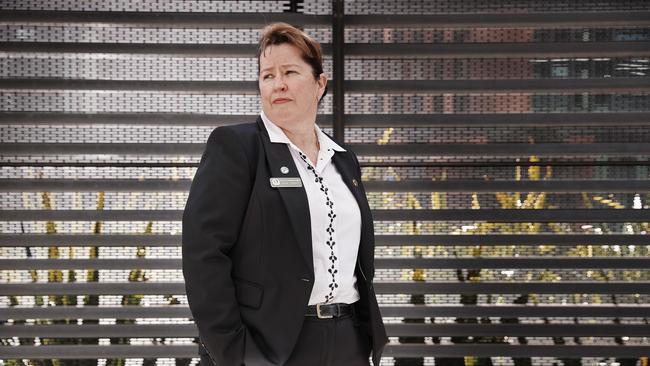‘Sextortion’: Parents urged to have conversations about ‘capping’ and ‘sextortion’ by eSafety and NSW Police
There’s been a spike in “sextortion” attempts, where children are being blackmailed into sharing intimate photos or videos of themselves for the dark web. Here’s how to protect your children.
NSW
Don't miss out on the headlines from NSW. Followed categories will be added to My News.
Children are being coerced into sharing sexual images of themselves and blackmailed into handing over more content under threat of exposure, with data revealing about one quarter of image abuse victims are underage.
Online sexual extortion, sometimes referred to as “sextortion”, is a form of blackmail that involves threats to share intimate images without consent unless the victim complies with demands.
The perpetrators may be individuals or organised crime groups, commonly based outside Australia.
According to eSafety Commissioner Julie Inman Grant, law enforcement agencies in Australia and overseas are seeing a “significant increase” in sexual extortion attempts.
The agency deals with complaints about sexual extortion through their Image-Based Abuse reporting scheme.
“We received almost 2700 complaints about image-based abuse in the first six months of this year, an increase of 114 per cent on the same period in 2021,” Ms Inman Grant said.
“About 65 per cent of all image-based abuse complaints we received involved some form of sexual extortion.
“About a quarter of all image-based abuse complaints were from people aged under 18.”
Child Abuse and Sex Crimes Squad Commander Detective Superintendent Jayne Doherty and Child Exploitation Internet Unit Manager Detective Inspector Chris Goddard spoke with NewsLocal about sextortion and “capping”.
The act of “capping” involves abusers duping or coercing children into producing sexualised videos which are then recorded or live streamed on the dark web and among paedophile groups.
“What we find there is people will engage with young people online, and ask them to self produce child abuse material and send it to them,” Commander Doherty explained.
“Then with the sextortion, they threaten to show their friends and families if they don’t pay money for it, or provide further images for them.
“Where the capping comes in is where they start using those first images to try and get people to give them more and more.”

Inspector Goddard said it’s wiser for parents to have conversations with their children regularly, and to make it clear there won’t be consequences or shame for coming forward.
He said it was essential parents or caregivers to be approachable.
“Kids need that confidence that they can come to somebody, either parent or a caregiver, to report that stuff when it happens, and that the first responses is to not to ground them and snatch their device off of them,” Inspector Goddard said.
“It’s about having those regular conversations about making sure that parents check their profile and who they’re interacting with online.”
Commander Doherty said parents need to be open with their children about these topics to put them at ease in coming forward to say “I’ve been asked to give some nudes over or sexual videos”.
“We tend to as parents go, ‘Well, I’m going to take that device away. So you can’t ever do this, again, I’m going to protect you like that’,” she said.
“But actually, what it does is it stops the kids coming forward, because, you know, that’s their link to their education, it’s their link to the entertainment, it’s their link to all of their friends.
“So if they’re worried that coming forward is going to make, make them lose their devices, again, they might not come forward, so it’s really important that kids understand and parents have the conversations with their kids that no matter what you’ve done online, the most important thing is to tell us about it, tell us preferably before you do it.”
The Australian Federal Police said Australian children as young as eight are being coerced into performing live-streamed sexual acts by online predators, who often record and share the videos on the dark net and sexually extort victims into producing even more graphic content.
The offending, known as “capping” for capturing, is one of the fastest growing trends of online child sexual abuse and children are being preyed on across all social media and video streaming platforms.
Many children believe they are interacting with a boy or girl of a similar age and may not realise their intimate act was recorded and circulated online, making them a victim of child sexual exploitation.

“Cappers” often posed as teenagers or modelling agents to gain the trust of their young victims, who are commonly aged 12 to 15.
The offenders then may broadcast a video they have recorded of one teen undressing and engaging in sexual activities, to trick another into believing they are watching it live and then reciprocating.
If questioned about why they are not talking on the video, the offenders claim their microphone is broken and they can only communicate using messaging functions.
The coercion and sextortion used by the offenders to gain additional material can cause significant fear and trauma. Sometimes the blackmail extends to forcing the child to include other friends or siblings in the sexually explicit behaviour.
AFP Detective Superintendent Jayne Crossling from the AFP-led Australian Centre to Counter Child Exploitation said investigators hoped highlighting the trend of sextortion would encourage children who have become victims to seek help and report the crime.
“Child victims need to be reassured help is available and by reporting what has happened, they may help us catch an offender and prevent other children being harmed,” she said in early September.
“Many victims are unwilling to report the abuse and even deny that anything has happened if identified and contacted by law enforcement.
“In addition to the threats and coercion, victims often feel like they have done something wrong and will be punished by parents or carers, or prosecuted by police, if their actions are discovered.”
Ms Inman Grant said if sexual extortion happens to someone under the age of 18, it is online child sexual abuse and should be reported to the AFP-led Australian Centre to Counter Child Exploitation.
She said eSafety plays a complementary role by providing a safety net for children and young people who can get confidential support, help with content removal, and online safety advice.
eSafety can help to quickly remove naked or sexual images shared without consent through their reporting portal.
“The most important thing to do is stop all contact with the blackmailer. Don’t pay or negotiate – it will lead to more threats and demands,” Ms Inman Grant said.
“Screenshot the evidence, including account names and any URLs, then report in-app and block.
“The psychological impact on victims can be significant, and eSafety encourages anyone experiencing these kinds of threats to reach out for support from an expert counselling service such as KidsHelpline or Lifeline.”
Originally published as ‘Sextortion’: Parents urged to have conversations about ‘capping’ and ‘sextortion’ by eSafety and NSW Police



